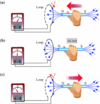Magnetism Flashcards
(40 cards)
What are the rules for drawing magnetic field lines?
The lines should never cross
The spacing of the lines represents the strength of the field
An arrow should be drawn to show the direction of force that a North Pole would feel
Describe the magnetic field pattern around a bar magnet
Fields lines are closer at the poles and flow from north to south

Describe the field pattern for magnets repelling and attracting
See diagram

Describe the field lines around a straight conductor
Circular rings

Describe the right hand curl rule
Magnetic fields around a straight conductor are concentric circles.
Curl you right hand into a fist and point your thumb in the direction of the current.
Your fingers will curl in the direction of the magnetic field

Describe a solenoid
A wire wrapped into a coil

Describe the magnetic field produced by a solenoid
Inside the coil its a strong and uniform field
Outside the field is similar to a bar magnet

How can you turn a solenoid into an electromagnet?
Adding an iron nail

Describe the motor effect
A current carrying wire produces a magnetic field field.
If this wire is placed near a permanent magnet, then the two fields will either attract or repel each other, exerting a force on each other.

Describe three ways to increase the size of the force experienced with the motor effect
- larger current
- Stronger magnets
- Longer length of wire in the magnetic field
Describe two ways the direction of the force in the motor effect can be reversed?
- Reversing the direction of the current
- Reversing the poles of the magnets

Describe Fleming’s left hand rule
Thumb, first finger and second finger are placed at right angles to each other.
ThuMb - Motion
First Finger - direction of magnetic field (North to south)
seCond finger - direction of current (positive to negative)

What are the units of magnetic flux density?
Tesla (T)
Define magnetic flux density
The force on one meter of wire carrying a current of one amp at right angles to the field
(B = F/IL)
Define the tesla
1 tesla = 1 NA-1m-1
Describe how the motor effect causes a motor to rotate
Current flows into the coil and creates a magentic field.
This magnetic field interacts with the permanent magnetic field creating a force.
The current flows out the coil. As the current has changed directions the force chages direction.
As each side of the motor has a force in opposite directions it rotates.

Describe a charged particles motion when it travel through a magnetic field thats at a right angle to its motion?
Flemings LHR shows that a particles velocity and force are always perpendicular (90°) to each other.
This means that a charged particles will always move in a circular path.
The particle will have a constant speed in a magnetic field but will always be accelerating towards the centre of the circle.

Why is the frequency of rotation independent of velocity?
If a particles speed increases it will follow a circular path with a larger radius so the time period and frequency remain constant
What is a velocity selector?
A velocity selector uses both electric and magnetic fields to select particles at a particular velocity.
It contains two parallel plates connected to a power supply with a uniform magnetic field applied perpendicular to the magnetic field.
Particles with a range of speeds enter and are deflected in opposite ways by the electric and magnetic fields.
Only particles with a specific speed will these deflections cancel so they travel in a straight line and emerge without being deflected.

Describe the structure of a cyclotron
A cyclotron is made up of two hollow semicircular electrodes with a uniform magnetic field applied perpendicular to the plane of the electrodes.
An alternating p.d. is applied between the electrodes.

Describe how a cyclotron works
- Charged particles enter the accelerator with a small velocity at the centre of one of the dees
- A magnetic field is applied at right angles to the dees, which accelerates particles into a semi circular path until they reach the gap
- An alternating voltage is applied between the dees to produce an electric field to accelerate the particles
- The frequency of the electric field must reverse polarity as particles reach the gap each time.
- The particles gain energy so travel faster and move in a larger semi circular path meaning they take the same time to travel each semi circle.

What is the difference between flux density and flux?
Magnetic flux density, B is a measure of the strength of a magnetic field. (number of field lines per unit area)
The magnetic flux, Φ passing through an area, perpendicular to the magnetic field is define as (the total number of field lines): Φ = BA

Describe electromagnetic induction
If there is relative motion between a conductor and a magnetic field, the free electrons will experience a force (F = BQv), which causes them to move to one end of the conductor.
This induces an electromotive force (e.m.f.) across the ends of the conductor.
If the coil is part of a complete circuit then an induced current will flow through it.
What is required for magnetic induction?
- A conductor
- Movement
- A magnetic field
- A complete circuit












